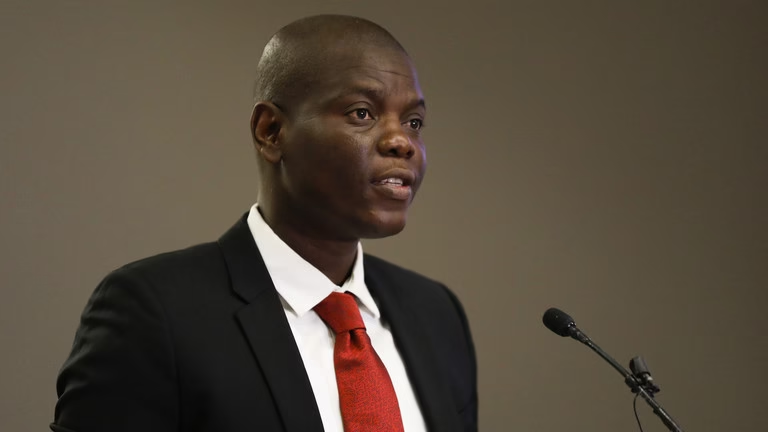South Africa finalizes Taiwan mission relocation from Pretoria to Johannesburg, marking a significant shift in its diplomatic positioning while reinforcing its long-standing One-China Policy.The move, announced by Minister of International Relations and Cooperation Ronald Lamola, underscores Pretoria’s effort to place relations with Taiwan strictly on commercial grounds while strengthening political alignment with Beijing.
South Africa Finalizes Taiwan Mission Relocation: Key Developments
South Africa’s Department of International Relations and Cooperation (DIRCO) has gazetted a notice confirming the relocation of Taiwan’s office from the country’s capital, Pretoria, to Johannesburg. The office, previously functioning as Taiwan’s unofficial embassy, will now be rebranded as the Taiwan Commercial Office in Johannesburg.
According to Minister Lamola, the relocation is already considered finalized despite earlier delays caused by negotiations. We consider it done. We have gazetted the relocation to the City of Johannesburg. Our relations with Taiwan are at a commercial level and in trade. This is not some South African exceptionalism but a common global practice,Lamola said.
The decision reflects South Africa’s official stance since 1997, when Pretoria ended its diplomatic ties with Taipei in favor of recognizing the People’s Republic of China.
Why South Africa Finalizes Taiwan Mission Relocation Now
Early in 2024, the South African government instructed Taiwan to vacate its Pretoria office by October. However, discussions between both sides extended the deadline to March 31, 2025. Even with the extension, the deadline was missed, reportedly due to continued negotiations over the terms of Taiwan’s future presence in the country.
With the publication of the relocation notice in the government gazette, Pretoria has now cemented the transition. This move comes at a time when South Africa’s foreign policy is increasingly aligned with Beijing, especially within multilateral platforms such as BRICS and the Shanghai Cooperation Organization (SCO), where China has a leading influence.
Taiwan Responds to Relocation
Taiwan has strongly criticized South Africa’s move and Minister Lamola’s recent remarks. During a media briefing, Lamola had stated that Taiwan had no representative office in Washington, DC — a claim swiftly rejected by Taipei.
In a statement, Taiwan’s Ministry of Foreign Affairs accused Lamola of making “false” and “misleading” claims, stressing that Taiwan maintains a representative office in Washington, despite not enjoying formal diplomatic relations with the United States.
“The Ministry of Foreign Affairs strongly refutes Minister Lamola’s claims, which not only contradicted reality but also highlighted South Africa’s grave lack of knowledge and misunderstanding of the international situation,” Taiwan’s statement read.
South Africa, China, and the ‘One-China Policy’
The decision to relocate Taiwan’s office aligns with South Africa’s adherence to the One-China Policy, which recognizes Beijing as the sole legitimate government of China. Since 1997, Pretoria has maintained that its relations with Taiwan are purely commercial, distancing itself from any formal diplomatic engagement.
This approach is not unique to South Africa. Many nations across Africa, Asia, and Europe have similar arrangements with Taiwan, limiting ties to trade and investment while avoiding official diplomatic recognition. China, which views Taiwan as part of its territory, has consistently pressed its partners to minimize Taiwan’s international presence.
South Africa’s Growing Alignment with BRICS Partners
The relocation comes as South Africa deepens its cooperation with BRICS states, particularly Russia and China. Recent diplomatic moves, including Pretoria’s consistent engagement with Moscow despite Western criticism over the Russia-Ukraine conflict, highlight its pivot toward multipolarity in global politics.
Within this context, finalizing Taiwan’s mission relocation further demonstrates South Africa’s intent to align its foreign policy with Beijing’s strategic interests.
What the Relocation Means for Trade and Diplomacy
By moving Taiwan’s presence from Pretoria to Johannesburg, South Africa is effectively shifting Taiwan’s representation into a purely economic role. Johannesburg, the country’s financial hub, is home to many international trade offices, making it a fitting location for Taiwan’s new commercial focus.
The move signals that Taiwan can continue to pursue business and trade relations with South Africa but under a narrower mandate. In 2024, trade between the two sides stood at over $2 billion, with Taiwan importing South African minerals and exporting electronics and machinery. The relocation is unlikely to disrupt these economic flows but sends a clear message about Pretoria’s diplomatic priorities.
South Africa finalizes Taiwan mission relocation in a decision that cements its alignment with Beijing while limiting Taiwan’s representation strictly to commercial affairs. The move, while largely symbolic, reflects Pretoria’s broader foreign policy trajectory of supporting China’s One-China Policy and strengthening ties within BRICS.
Taiwan’s criticism of the decision underscores the geopolitical sensitivities surrounding its international recognition. However, for South Africa, the relocation signals continuity in a policy that has been in place since 1997, reaffirming that when it comes to diplomacy, Beijing remains at the center of its China-Taiwan strategy.



